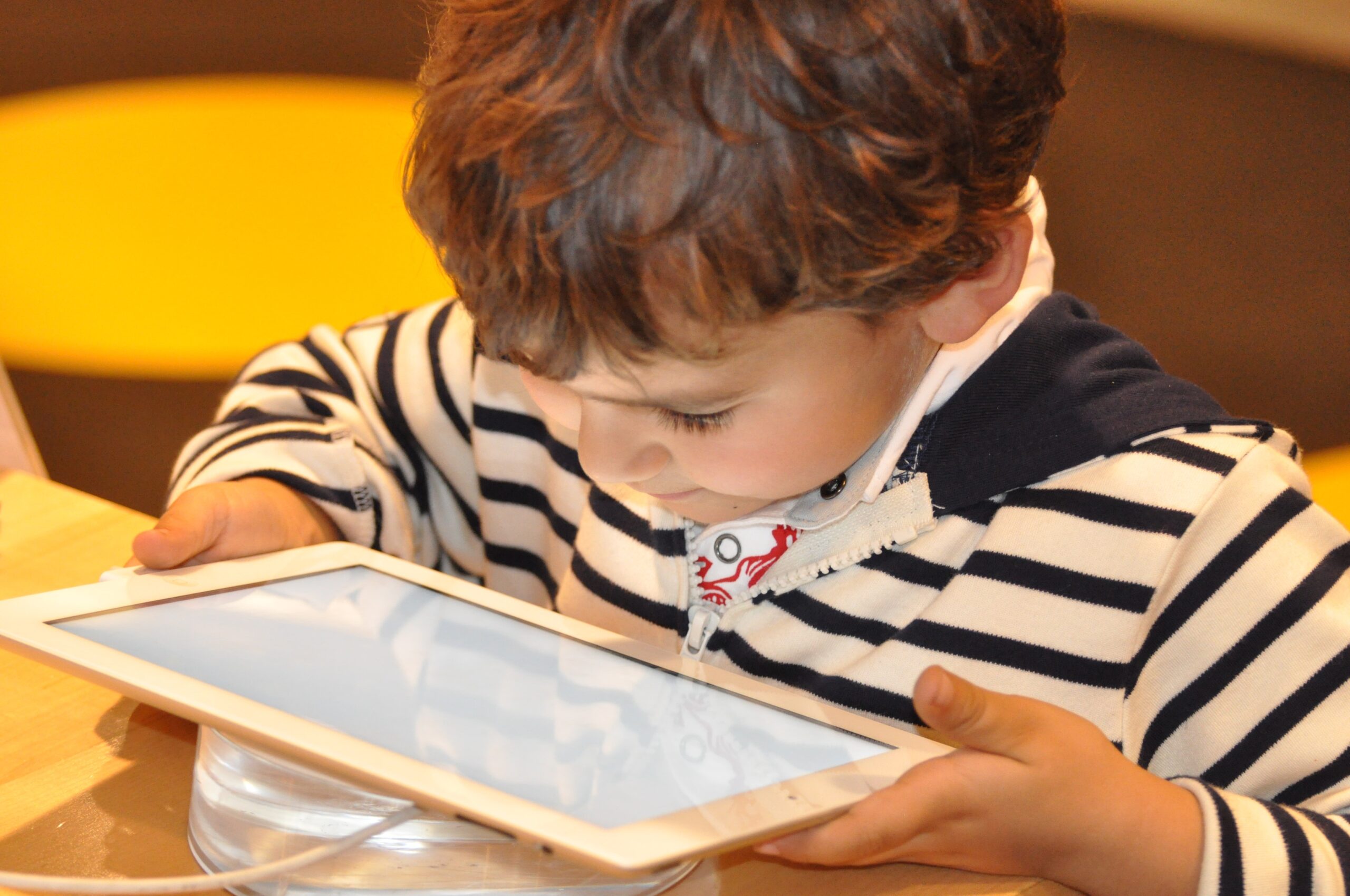The UK’s new online safety regulator publishes its annual assessment on children’s media use, including revelations that a third of those aged between five and seven use the internet independently
An Ofcom report has revealed that large proportions of children as young as five are using social networks and other online platforms without supervision.
Ofcom’s annual study of children’s relationship with the media and online world has revealed around a quarter of those aged five to seven owns a smartphone, while more than three-quarters use a tablet.
Almost a third of parents of five-to-seven-year-olds said their child uses social media independently, with three in ten admitting they are likely to allow their child to have a social media profile before they reach the minimum age required. Almost half (48%) of five to seven-year-olds have personal profiles on YouTube or YouTube Kids.
However, about three quarters of parents of those aged five to seven said they have discussed how to stay safe online with their children.
Overall, the use of social media by this age group has increased by 8% year on year, with WhatsApp seeing the biggest annual growth. Online gaming has also had an annual increase of 7%, with those playing shooting games reaching a record-high following a 15% rise this past year.
The report also revealed a gap in communication between parents and older children – 8 to 17 years old – on their exposure to harmful content. A third of this age group said they had seen harmful content yet over the last year, but only one in five parents said their child had told them about seeing scary or upsetting content online.
Related content
- Ofcom requires £113m extra investment and 100 new staff to deliver online safety regulation
- Former tech minister warns Online Safety Bill could weaken apps’ cyber protection
- Senior tech execs could face prison for breaching online safety laws
Girls within this age group were also more likely to experience hurtful interactions online compared to boys. Also, more than nine in ten children aged eight to 17 also said they had at least one lesson on online safety at school, yet only three in ten said they had regular online safety lessons.
The findings come as Ofcom announces an additional area of focus for child safety, building on the measures set out in their draft Children’s Safety Code of Practice – on which the public will be invited to provide feedback on, in a consultation beginning next month. The regulatory authority also plans to conduct a consultation later this year on how automated tools, including artificial intelligence, can help detect illegal content and content harmful to children.
As the Online Safety Act passed into law in October, Ofcom formally took on responsibility for overseeing the implementation – and enforcement – of the legislation. The watchdog, which also regulates print, online and broadcast media, has indicated that the measures set out in the new laws will be rolled out incrementally, with the regulator intending to implement the regime in the most harmful areas first.
The regulations – which require online platforms “proportionate measures to effectively mitigate and manage the risks of harm from illegal content” – give Ofcom the power to issue fines of £18m or up to 10% of the worldwide turnover for any firm that breaches the rules. In the case of Twitter, this could equate to almost £300m, while Facebook could theoretically be hit with a near-£11bn penalty.
PublicTechnology revealed last week that Ofcom has acquired tranches of “sensitive material” to test the capabilities of the automation technology used by such platforms to detect illegal or harmful content.





https://k-studio.kr/무면허운전-단속-면허취소-결격기간-1년-또-걸렸다면/
벼룩시장 신문그대로보기 (구인구직, 부동산) 벼룩시장 신문그대로보기 바로가기 그리고 지역별 벼룩시장 종이신문그대로보기 방법 (구인구직, 부동산) 알아볼게요. 교차로신문 같이 벼룩시장은 지역별 일자리, 구인구직, 부동산 등 다양한 정보를 제공해요. 교차로신문그대로보기 바로가기는 아래에서 확인하고, 오늘은 벼룩시장 신문그대로보기 바로가기 그리고 사용법 섹스카지노사이트
벼룩시장 신문그대로보기 (구인구직, 부동산) 벼룩시장 신문그대로보기 바로가기 그리고 지역별 벼룩시장 종이신문그대로보기 방법 (구인구직, 부동산) 알아볼게요. 교차로신문 같이 벼룩시장은 지역별 일자리, 구인구직, 부동산 등 다양한 정보를 제공해요. 교차로신문그대로보기 바로가기는 아래에서 확인하고, 오늘은 벼룩시장 신문그대로보기 바로가기 그리고 사용법 섹스카지노사이트
벼룩시장 신문그대로보기 (구인구직, 부동산) 벼룩시장 신문그대로보기 바로가기 그리고 지역별 벼룩시장 종이신문그대로보기 방법 (구인구직, 부동산) 알아볼게요. 교차로신문 같이 벼룩시장은 지역별 일자리, 구인구직, 부동산 등 다양한 정보를 제공해요. 교차로신문그대로보기 바로가기는 아래에서 확인하고, 오늘은 벼룩시장 신문그대로보기 바로가기 그리고 사용법 섹스카지노사이트
벼룩시장 신문그대로보기 (구인구직, 부동산) 벼룩시장 신문그대로보기 바로가기 그리고 지역별 벼룩시장 종이신문그대로보기 방법 (구인구직, 부동산) 알아볼게요. 교차로신문 같이 벼룩시장은 지역별 일자리, 구인구직, 부동산 등 다양한 정보를 제공해요. 교차로신문그대로보기 바로가기는 아래에서 확인하고, 오늘은 벼룩시장 신문그대로보기 바로가기 그리고 사용법 섹스카지노사이트
벼룩시장 신문그대로보기 (구인구직, 부동산) 벼룩시장 신문그대로보기 바로가기 그리고 지역별 벼룩시장 종이신문그대로보기 방법 (구인구직, 부동산) 알아볼게요. 교차로신문 같이 벼룩시장은 지역별 일자리, 구인구직, 부동산 등 다양한 정보를 제공해요. 교차로신문그대로보기 바로가기는 아래에서 확인하고, 오늘은 벼룩시장 신문그대로보기 바로가기 그리고 사용법 섹스카지노사이트
벼룩시장 신문그대로보기 (구인구직, 부동산) 벼룩시장 신문그대로보기 바로가기 그리고 지역별 벼룩시장 종이신문그대로보기 방법 (구인구직, 부동산) 알아볼게요. 교차로신문 같이 벼룩시장은 지역별 일자리, 구인구직, 부동산 등 다양한 정보를 제공해요. 교차로신문그대로보기 바로가기는 아래에서 확인하고, 오늘은 벼룩시장 신문그대로보기 바로가기 그리고 사용법 섹스카지노사이트
벼룩시장 신문그대로보기 (구인구직, 부동산) 벼룩시장 신문그대로보기 바로가기 그리고 지역별 벼룩시장 종이신문그대로보기 방법 (구인구직, 부동산) 알아볼게요. 교차로신문 같이 벼룩시장은 지역별 일자리, 구인구직, 부동산 등 다양한 정보를 제공해요. 교차로신문그대로보기 바로가기는 아래에서 확인하고, 오늘은 벼룩시장 신문그대로보기 바로가기 그리고 사용법 섹스카지노사이트
벼룩시장 신문그대로보기 (구인구직, 부동산) 벼룩시장 신문그대로보기 바로가기 그리고 지역별 벼룩시장 종이신문그대로보기 방법 (구인구직, 부동산) 알아볼게요. 교차로신문 같이 벼룩시장은 지역별 일자리, 구인구직, 부동산 등 다양한 정보를 제공해요. 교차로신문그대로보기 바로가기는 아래에서 확인하고, 오늘은 벼룩시장 신문그대로보기 바로가기 그리고 사용법 섹스카지노사이트
벼룩시장 신문그대로보기 (구인구직, 부동산) 벼룩시장 신문그대로보기 바로가기 그리고 지역별 벼룩시장 종이신문그대로보기 방법 (구인구직, 부동산) 알아볼게요. 교차로신문 같이 벼룩시장은 지역별 일자리, 구인구직, 부동산 등 다양한 정보를 제공해요. 교차로신문그대로보기 바로가기는 아래에서 확인하고, 오늘은 벼룩시장 신문그대로보기 바로가기 그리고 사용법 섹스카지노사이트
대전세븐나이트
전신스타킹
강남안마시술소중계업체
이태원스웨디시안마게이클럽
https://klero.tistory.com/tag/틱톡어플
https://klero.tistory.com/tag/청년내일저축계좌20신청
하동동해출장만남 소자본 창업
아름다운스웨디시업소
안성출장마사지
안성출장마사지
하동동해출장만남 소자본 창업
https://pornmaster.fun/hd/依托咪酯购买唯一购买联系飞机电报:ppy883-dei
https://pornmaster.fun/hd/跑步机后入番号ww3008-cc跑步机后入番号-dwk
https://pornmaster.fun/hd/lyfonmpfet4
https://pws1999.tistory.com/131
https://pws1999.tistory.com/185
https://mrdeeply.tistory.com/619
https://mrdeeply.tistory.com/103
대전나이트클럽
대전세븐나이트
하동동해출장만남 소자본 창업
https://itlearn.kr/
https://itlearn.kr/파워포인트-무료설치-다운로드-방법/
벼룩시장 구인구직 및 신문 그대로 보기 (PC/모바일) | 구인구직 앱 어플 무료 설치 다운로드 | 모바일 벼룩시장 보는 방법 | 벼룩시장 부동산 | 지역별 벼룩시장 | 벼룩시장 종이신문 에 대해 알아보겠습니다. 섹스카지노사이트
벼룩시장 구인구직 및 신문 그대로 보기 (PC/모바일) | 구인구직 앱 어플 무료 설치 다운로드 | 모바일 벼룩시장 보는 방법 | 벼룩시장 부동산 | 지역별 벼룩시장 | 벼룩시장 종이신문 에 대해 알아보겠습니다. 섹스카지노사이트
안성출장마사지
양산시술출장마사지
대전호박나이트
청도페이스라인출장
수원출장샵
이태원스웨디시안마게이클럽
이태원게이바
영등포안마살롱
거제출장안마
수원출장샵
전신스타킹
청도페이스라인출장
https://itlearn.kr/파워포인트-무료설치-다운로드-방법/
https://itgunza.com/345
https://itgunza.com/425
https://itgunza.com/932
https://itgunza.com/134
https://itgunza.com/932
https://honeytiplabs.com/아이폰-아이패드-사진-숨기기-앨범-가리기-안보이게/
https://honeytiplabs.com/아이폰-한글-파일/
https://ajaedotcom.tistory.com/entry/무료벨소리다운-하는-방법
https://honeytiplabs.com/인스타그램-프로필-사진-다운로드-초쉬운-방법/
https://honeytiplabs.com/아이폰-동영상-합치기/
https://honeytiplabs.com/아이폰-스크롤캡쳐/
https://ajaedotcom.tistory.com/entry/카카오택시-경유지-설정하기
충무로출장업소
양산시술출장마사지
https://ddnews.co.kr/blog/category/it/page/6/
충무로출장업소
https://ddnews.co.kr/blog/category/money/
청도페이스라인출장
충무로출장업소
https://nicesongtoyou.com/welfare/middle-aged/
대전나이트클럽
https://nicesongtoyou.com/free-legal-center/
울산콜걸
거제출장안마
https://nicesongtoyou.com/welfare/
대전나이트클럽
강남안마시술소중계업체
이태원스웨디시안마게이클럽
https://sportscom.co.kr/토트넘-맨시티-중계-1204/
https://chotiple.tistory.com/tag/전주교차로20바로가기
https://sportscom.co.kr/spotv-now/
https://chotiple.tistory.com/tag/목포교차로20바로가기
https://gorgopage.com/쏘카-이용요금-이용료-가격-편도-자기부담금-1억-이유/
https://madreviewer.tistory.com/tag/피자나라치킨공주
https://madreviewer.tistory.com/tag/프로바이오틱스의20효능
https://gorgopage.com/신용점수올리기-5가지-방법신용등급-점수표/
https://dnolife.net/software/twitch/
https://nicesongtoyou.com/free-legal-center/
https://dnolife.net/software/ldplayer/
https://nicesongtoyou.com/tax/real-estate-tax/
https://fifaworldcup.modoo.at/
http://dnolife.net/
https://dnolife.net/software/evernote/
https://dnolife.net/software/twitch/
수원출장샵
하동동해출장만남 소자본 창업
대전세븐나이트
https://itgunza.com/223
https://itmoney4you.com/멜로망스-대구콘서트/
https://itmoney4you.com/마녀의게임-다시보기/
영등포안마살롱
거제출장안마
https://madreviewer.tistory.com/tag/프로바이오틱스유산균
https://madreviewer.tistory.com/tag/중증
https://www.ohgunstory.com/entry/EC9AB8EC82B0EC868CEC8B9D-EAB5ACEC9DB8EAB5ACECA781-ECA285EBA38C
https://k-studio.kr/건설업-기초안전보건교육-이수증-취득방법/
https://gorgopage.com/고향사랑-기부제-답례품-기부-납추-취소-포인트-방법-10/
이태원게이바
https://souhaya.tistory.com/1229
http://baekis.egloos.com/page/3
The information shared is of top quality which has to get appreciated at all levels. Well done…
I love what you guys tend to be up too. Such clever work and exposure! Keep up the excellent works guys I’ve added you guys to my own blogroll.
https://download-install.com/entry/알송-다운로드-설치
카지노사이트 카지노사이트 카지노사이트 카지노사이트 카지노사이트 카지노사이트 카지노사이트
카지노사이트
카지노사이트 카지노사이트 카지노사이트 카지노사이트 카지노사이트 카지노사이트
카지노사이트 카지노사이트 카지노사이트 카지노사이트 카지노사이트 카지노사이트 카지노사이트
카지노사이트 카지노사이트 카지노사이트 카지노사이트
카지노사이트 카지노사이트 카지노사이트
카지노사이트 카지노사이트 카지노사이트 카지노사이트
카지노사이트 카지노사이트 카지노사이트
카지노사이트 카지노사이트 카지노사이트
카지노사이트 카지노사이트 카지노사이트 카지노사이트
카지노사이트 카지노사이트 카지노사이트 카지노사이트 카지노사이트 카지노사이트 카지노사이트
카지노사이트
카지노사이트 카지노사이트 카지노사이트 카지노사이트 카지노사이트 카지노사이트
카지노사이트 카지노사이트 카지노사이트 카지노사이트 카지노사이트 카지노사이트 카지노사이트
카지노사이트 카지노사이트 카지노사이트 카지노사이트 카지노사이트 카지노사이트 카지노사이트
카지노사이트 카지노사이트카지노사이트 카지노사이트 카지노사이트
카지노사이트 카지노사이트
카지노사이트 카지노사이트 카지노사이트 카지노사이트 카지노사이트 카지노사이트 카지노사이트
카지노사이트 카지노사이트 카지노사이트 카지노사이트
카지노사이트 카지노사이트 카지노사이트
카지노사이트 카지노사이트 카지노사이트 카지노사이트 카지노사이트
카지노사이트 카지노사이트
카지노사이트 카지노사이트 카지노사이트
카지노사이트 카지노사이트 카지노사이트 카지노사이트
카지노사이트 카지노사이트 카지노사이트 카지노사이트 카지노사이트 카지노사이트 카지노사이트
카지노사이트 카지노사이트 카지노사이트
카지노사이트 카지노사이트 카지노사이트 카지노사이트
카지노사이트 카지노사이트 카지노사이트 카지노사이트 카지노사이트카지노사이트 카지노사이트
https://mintfin.tistory.com/tag/쿠팡플레이20토트넘20중계
https://dnolife.net/software/autoclick/
https://dnolife.net/software/scapture/
Mexican Easy Pharm: Mexican Easy Pharm – mexican rx online
https://mrdeeply.tistory.com/579
buying prescription drugs in mexico online https://mexicaneasypharm.com/# medication from mexico pharmacy
buying prescription drugs in mexico
best online pharmacies in mexico https://mexicaneasypharm.com/# buying prescription drugs in mexico online
buying prescription drugs in mexico
https://kamapharm.shop/# Kamagra tablets
buy prednisone canada
http://cytpharm.com/# buy cytotec
where to buy prednisone in canada
https://semapharm24.shop/# rybelsus semaglutide tablets
prednisone 20mg nz
http://predpharm.com/# average cost of prednisone
prednisone 1 mg for sale
https://semapharm24.shop/# semaglutide tablets for weight loss
prednisone 20
http://semapharm24.com/# semaglutide tablets
prednisone 10mg tablet cost
https://predpharm.com/# prednisone 0.5 mg
prednisone price
https://kr.new-version.app/download/gomrecorder/
https://cytpharm.shop/# CytPharm
prednisone 0.5 mg
https://cytpharm.com/# Cyt Pharm
can you buy prednisone over the counter in canada
https://kamapharm.shop/# sildenafil oral jelly 100mg kamagra
prednisone 5mg coupon
http://kamapharm.com/# buy Kamagra
ordering prednisone
https://honeytipit.tistory.com/tag/SPOTV20Prime
https://kamapharm.shop/# sildenafil oral jelly 100mg kamagra
5 mg prednisone daily
카지노사이트 카지노사이트
카지노사이트 카지노사이트 카지노사이트 카지노사이트
카지노사이트
http://predpharm.com/# PredPharm
prednisone 30 mg coupon
https://farmaprodotti.shop/# farmaci senza ricetta elenco
Farmacia online miglior prezzo
https://klero.tistory.com/tag/미스터트롯20임영웅20노래모음
https://farmasilditaly.com/# kamagra senza ricetta in farmacia
farmacie online affidabili
https://farmasilditaly.com/# viagra acquisto in contrassegno in italia
Farmacia online piГ№ conveniente
http://farmaprodotti.com/# Farmacie online sicure
farmacie online affidabili
viagra ordine telefonico: viagra online consegna rapida – viagra online spedizione gratuita
http://phmacao.life/# Resorts provide both gaming and relaxation options.
Players can enjoy high-stakes betting options.
Las apuestas mГnimas son accesibles para todos.: win chile – winchile casino
Slot machines feature various exciting themes.: phtaya.tech – phtaya casino
https://tiptravel.tistory.com/49
https://bestkkultip.tistory.com/40
https://bestkkultip.tistory.com/46
https://bestkkultip.tistory.com/3
The casino atmosphere is thrilling and energetic. https://taya777.icu/# Players must be at least 21 years old.
카지노사이트 카지노사이트 카지노사이트 카지노사이트
카지노사이트 카지노사이트 카지노사이트
jugabet jugabet.xyz Los torneos de poker generan gran interГ©s.
https://taya777.icu/# High rollers receive exclusive treatment and bonuses.
Resorts provide both gaming and relaxation options.
The casino industry supports local economies significantly.: phtaya – phtaya
Players often share tips and strategies. https://phmacao.life/# Casino promotions draw in new players frequently.
카지노사이트 카지노사이트 카지노사이트 카지노사이트 카지노사이트 카지노사이트 카지노사이트
https://taya365.art/# Slot machines attract players with big jackpots.
Gambling can be a social activity here.
Gambling can be a social activity here.: phmacao com – phmacao com
Casinos often host special holiday promotions. https://phtaya.tech/# Gambling regulations are strictly enforced in casinos.
winchile winchile.pro Los casinos ofrecen entretenimiento en vivo.
https://taya365.art/# High rollers receive exclusive treatment and bonuses.
Resorts provide both gaming and relaxation options.
The thrill of winning keeps players engaged.: taya365 login – taya365
http://winchile.pro/# Los casinos garantizan una experiencia de calidad.
Casinos offer delicious dining options on-site.
Casino promotions draw in new players frequently. http://winchile.pro/# Las experiencias son Гєnicas en cada visita.
Security measures ensure a safe environment.: taya777 – taya777 register login
https://taya777.icu/# Promotions are advertised through social media channels.
Live music events often accompany gaming nights.
taya365 taya365 com login The ambiance is designed to excite players.
여행지
The thrill of winning keeps players engaged. https://phmacao.life/# A variety of gaming options cater to everyone.
http://taya777.icu/# Many casinos have beautiful ocean views.
The thrill of winning keeps players engaged.
Players enjoy both fun and excitement in casinos.: taya365 com login – taya365
Casinos often host special holiday promotions. http://jugabet.xyz/# La variedad de juegos es impresionante.
http://taya365.art/# The casino scene is constantly evolving.
Slot machines attract players with big jackpots.
phmacao com phmacao.life Casinos offer delicious dining options on-site.
Las promociones de fin de semana son populares.: jugabet casino – jugabet casino
http://winchile.pro/# Las estrategias son clave en los juegos.
Casinos often host special holiday promotions.
Gambling can be a social activity here. http://phmacao.life/# Casino promotions draw in new players frequently.
The casino industry supports local economies significantly.: phtaya login – phtaya.tech
https://taya365.art/# Game rules can vary between casinos.
Responsible gaming initiatives are promoted actively.
Game rules can vary between casinos. https://winchile.pro/# Los casinos organizan noches de trivia divertidas.
phmacao com login phmacao club Live dealer games enhance the casino experience.
Slot tournaments create friendly competitions among players.: taya777.icu – taya777 login
http://phmacao.life/# High rollers receive exclusive treatment and bonuses.
Promotions are advertised through social media channels.
Slot machines attract players with big jackpots.: taya777 login – taya777
Players enjoy a variety of table games. https://jugabet.xyz/# Es comГєn ver jugadores sociales en mesas.
The Philippines has a vibrant nightlife scene.: taya777 login – taya777 register login
http://phtaya.tech/# Slot machines feature various exciting themes.
The casino experience is memorable and unique.
The thrill of winning keeps players engaged.: phmacao.life – phmacao.life
http://taya365.art/# The casino atmosphere is thrilling and energetic.
The Philippines offers a rich gaming culture.
Some casinos feature themed gaming areas.: taya365 com login – taya365
http://phmacao.life/# Live music events often accompany gaming nights.
Cashless gaming options are becoming popular.
Los casinos garantizan una experiencia de calidad.: jugabet casino – jugabet casino
http://taya365.art/# Live music events often accompany gaming nights.
Players must be at least 21 years old.
win chile win chile Los jugadores deben jugar con responsabilidad.
Some casinos have luxurious spa facilities.: taya365 – taya365.art
Los croupiers son amables y profesionales.: jugabet – jugabet
http://phtaya.tech/# The ambiance is designed to excite players.
The poker community is very active here.
Many casinos provide shuttle services for guests. http://taya365.art/# Cashless gaming options are becoming popular.
http://phtaya.tech/# Some casinos feature themed gaming areas.
The gaming floors are always bustling with excitement.
The casino scene is constantly evolving.: phmacao club – phmacao club
Game rules can vary between casinos.: phmacao casino – phmacao club
winchile winchile casino Los croupiers son amables y profesionales.
http://taya365.art/# Manila is home to many large casinos.
The Philippines offers a rich gaming culture.
Responsible gaming initiatives are promoted actively.: phtaya – phtaya login
The Philippines has a vibrant nightlife scene.: taya777 app – taya777 register login
https://jugabet.xyz/# Los casinos celebran festivales de juego anualmente.
The casino experience is memorable and unique.
Casinos often host special holiday promotions.: taya365.art – taya365 com login
phtaya casino phtaya.tech The poker community is very active here.
http://taya777.icu/# The casino experience is memorable and unique.
A variety of gaming options cater to everyone.
The poker community is very active here.: taya365 – taya365
Gaming regulations are overseen by PAGCOR. http://jugabet.xyz/# Los casinos reciben turistas de todo el mundo.
Many casinos host charity events and fundraisers.: phtaya login – phtaya login
La iluminaciГіn crea un ambiente vibrante.: win chile – winchile casino
http://phmacao.life/# Resorts provide both gaming and relaxation options.
Slot tournaments create friendly competitions among players.
phtaya login phtaya.tech Many casinos offer luxurious amenities and services.
Visitors come from around the world to play.: phtaya – phtaya login
벼룩시장 신문그대로보기 (구인구직, 부동산) 벼룩시장 신문그대로보기 바로가기 그리고 지역별 벼룩시장 종이신문그대로보기 방법 (구인구직, 부동산) 알아볼게요. 교차로신문 같이 벼룩시장은 지역별 일자리, 구인구직, 부동산 등 다양한 정보를 제공해요. 교차로신문그대로보기 바로가기는 아래에서 확인하고, 오늘은 벼룩시장 신문그대로보기 바로가기 그리고 사용법 섹스카지노사이트
벼룩시장 신문그대로보기 (구인구직, 부동산) 벼룩시장 신문그대로보기 바로가기 그리고 지역별 벼룩시장 종이신문그대로보기 방법 (구인구직, 부동산) 알아볼게요. 교차로신문 같이 벼룩시장은 지역별 일자리, 구인구직, 부동산 등 다양한 정보를 제공해요. 교차로신문그대로보기 바로가기는 아래에서 확인하고, 오늘은 벼룩시장 신문그대로보기 바로가기 그리고 사용법 섹스카지노사이트
벼룩시장 신문그대로보기 (구인구직, 부동산) 벼룩시장 신문그대로보기 바로가기 그리고 지역별 벼룩시장 종이신문그대로보기 방법 (구인구직, 부동산) 알아볼게요. 교차로신문 같이 벼룩시장은 지역별 일자리, 구인구직, 부동산 등 다양한 정보를 제공해요. 교차로신문그대로보기 바로가기는 아래에서 확인하고, 오늘은 벼룩시장 신문그대로보기 바로가기 그리고 사용법 섹스카지노사이트
https://phmacao.life/# The casino experience is memorable and unique.
The poker community is very active here.
Los torneos de poker generan gran interГ©s.: win chile – winchile casino
http://winchile.pro/# Los jugadores deben conocer las reglas.
Live music events often accompany gaming nights.
Visitors come from around the world to play. http://jugabet.xyz/# Las aplicaciones mГіviles permiten jugar en cualquier lugar.
Online gaming is also growing in popularity.: taya777 – taya777 login
winchile casino winchile La Г©tica del juego es esencial.
http://phtaya.tech/# Poker rooms host exciting tournaments regularly.
Some casinos have luxurious spa facilities.
foreign pharmacy no prescription https://xxlmexicanpharm.shop/# medicine in mexico pharmacies
uk pharmacy no prescription https://xxlmexicanpharm.shop/# xxl mexican pharm
easy canadian pharm: easy canadian pharm – easy canadian pharm
xxl mexican pharm: xxl mexican pharm – xxl mexican pharm
rx pharmacy no prescription https://easycanadianpharm.com/# easy canadian pharm
rx pharmacy no prescription https://megaindiapharm.com/# MegaIndiaPharm
Mega India Pharm Mega India Pharm Mega India Pharm
buying prescription drugs from canada https://megaindiapharm.shop/# indian pharmacy
п»їbest mexican online pharmacies: п»їbest mexican online pharmacies – xxl mexican pharm
legal online pharmacy coupon code http://familypharmacy.company/# Best online pharmacy
drugstore com online pharmacy prescription drugs https://easycanadianpharm.shop/# easy canadian pharm
MegaIndiaPharm: MegaIndiaPharm – top 10 online pharmacy in india
online pharmacy delivery usa: non prescription medicine pharmacy – Online pharmacy USA
canadian pharmacy coupon code https://familypharmacy.company/# Best online pharmacy
pharmacy without prescription drugstore com online pharmacy prescription drugs discount drug mart
rxpharmacycoupons https://xxlmexicanpharm.com/# mexican mail order pharmacies
easy canadian pharm: my canadian pharmacy – easy canadian pharm
discount drug mart pharmacy: discount drugs – drugmart
pharmacy website india: MegaIndiaPharm – Mega India Pharm
discount drug mart pharmacy: discount drug pharmacy – promo code for canadian pharmacy meds
promo code for canadian pharmacy meds canadian online pharmacy no prescription online pharmacy delivery usa
canadian pharmacy coupon code http://xxlmexicanpharm.com/# medicine in mexico pharmacies
canadian pharmacy no prescription https://megaindiapharm.shop/# Mega India Pharm
MegaIndiaPharm: best online pharmacy india – Mega India Pharm
best online pharmacies in mexico: best online pharmacies in mexico – buying from online mexican pharmacy
rx pharmacy coupons http://discountdrugmart.pro/# discount drug pharmacy
drug mart: drug mart – discount drugs
xxl mexican pharm: п»їbest mexican online pharmacies – buying prescription drugs in mexico
MegaIndiaPharm Mega India Pharm MegaIndiaPharm
canadian pharmacy world coupon https://megaindiapharm.com/# MegaIndiaPharm
pharmacy online 365 discount code http://familypharmacy.company/# online pharmacy no prescription
xxl mexican pharm: medicine in mexico pharmacies – xxl mexican pharm
easy canadian pharm: easy canadian pharm – easy canadian pharm
https://itgunza.com/3457
canadian pharmacy coupon https://discountdrugmart.pro/# drug mart
rxpharmacycoupons https://xxlmexicanpharm.shop/# xxl mexican pharm
canadian pharmacy meds canadapharmacyonline cheap canadian pharmacy online
xxl mexican pharm: pharmacies in mexico that ship to usa – xxl mexican pharm
no prescription needed pharmacy: foreign pharmacy no prescription – drug mart
cheapest pharmacy prescription drugs https://discountdrugmart.pro/# drugmart
online pharmacy no prescription http://familypharmacy.company/# family pharmacy
canadian pharmacy cheap: canadianpharmacyworld com – easy canadian pharm
MegaIndiaPharm: Mega India Pharm – MegaIndiaPharm
canadian pharmacy without prescription https://discountdrugmart.pro/# discount drug pharmacy
canadian pharmacy no prescription needed Cheapest online pharmacy Online pharmacy USA
us pharmacy no prescription: best online pharmacy no prescription – Best online pharmacy
pharmacy coupons https://easycanadianpharm.com/# easy canadian pharm